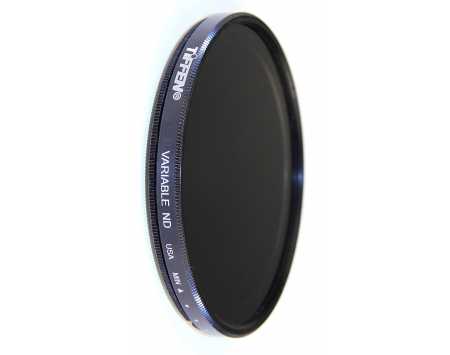Tiffen Variable ND Filter (77mm, 2 to 8-Stop)

This 77mm Variable ND Filter from Tiffen offers a unique way of maintaining control over your depth of field and presents an efficient way to create special effects. The filter is designed with a built-in rotating ring that controls neutral density ranging from 2 to 8 stops (0.6-2.4). The heavier the density, the slower your shutter speed will be. This longer exposure allows the shutter to remain open long enough to record the same amount of light, but will also create movement within the shot. Another major benefit of this filter is that it eliminates having to buy and carry around individual neutral density filters. With this one filter, you can rotate to the degree of ND you want, saving money and time.
Simply mount the filter on your lens, set it to "Min" density, then frame and focus. Care must be taken when focusing at heavier densities to make sure focus is accurate. If it isn't, you can switch to manual focus and rotate to the desired degree of filtration.
For example, if your standard exposure without the filter is 1/500 at f/8 and you then set the filter to "Min", you change the shutter speed to 1/125 at the same aperture - thereby losing 2 stops of speed while gaining a hint of blur in the image. If that's not enough filtration, continue rotating the filter until you reach the shutter speed you desire. Using the above example, you can get down to 1/2 second at f/8 (8 stops). It should be noted that the calibration marks on the filter ring are to be used only for reference and should not be regarded as accurate settings for specific densities.
Neutral Density filters are used to create unusual special effects including capturing the blur of rippling water in a waterfall or the swirling effect of city traffic. Since it allows the use of slower shutter speeds in bright light, it becomes possible to create special effects that would normally not be possible without the filter. Since it can also help control your depth of field, it permits you to shoot at wider apertures. Ultimately, its value is in helping to prevent bright, overly washed-out images shot in bright light.
The ColorCore process allows Tiffen to control the color and density of their filters, and the characteristics of special effects filters with greater accuracy than typical dyed-in-the-mass filters, which usually exhibit color and density variations. In this way, Tiffen can better control the various densities of their filters and thereby create more exact degrees of filtration.
- The wider front filter ring helps reduce the possibility of vignetting (the darkening of corners) at wide angles and is not deep enough to accommodate a lens cap
- It allows you to have continuous control over the amount of light coming through your lens in an approximate range of 2 (ND 0.6) to 8 (ND 2.4) stops
- To enable slow shutter speeds to be used, especially with high-speed ISOs, to record movement in subjects such as waterfalls, clouds, or cars
- To decrease depth of field by allowing wider apertures to be used, which helps separate subjects from their background
- To decrease the effective ISO of high-speed film (above ISO 400) and allow it to be used outdoors in bright situations
- To allow cine and video cameras (which have fixed shutter speeds) to film snow, sand, or other bright scenes which could cause overexposure
- Allows control over the color and density of filters, and the characteristics of special effects filters with greater accuracy than typical dyed-in-the-mass filters, which usually exhibit color and density variations
- Offers better control over various densities of filters and creates more exact degrees of filtration
- Tiffen is a leader in the filter industry and proudly makes their filters in the USA
